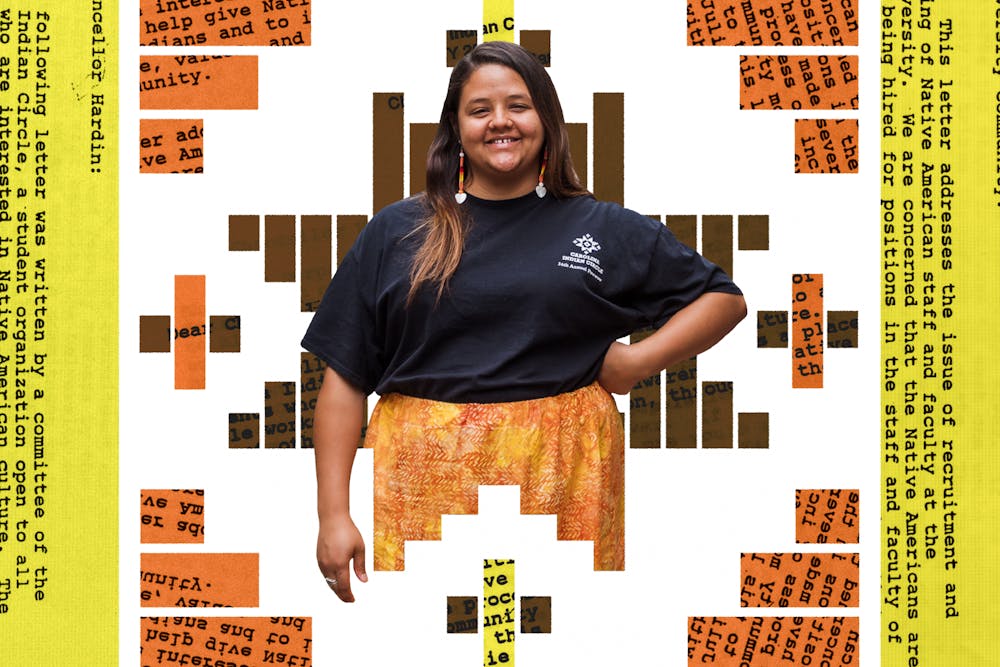“For an organization that had been on this campus going on 49 years currently — we'll be celebrating 50 next year — how do you not have any of that information?” Locklear asked.
With the help of Smith, Locklear was able to apply for funding and officially start an independent study for her new research project— “Archiving Indigenous Life at UNC for Indigenous Futures." She received the William C. Friday Arts and Humanities Research Award and was given a $2,000 stipend for her research.
Locklear began to work with Wilson Library and UNC's American Indian Center to create both a digitized and physical public archive about the history of the CIC.
The archive will include pictures, recordings and important documents that preserve the history of the CIC — largely from members of the community itself. Smith said the Indigenous community is excited to partner with Locklear to help gather resources about past and present members.
“People are getting very excited to build into this and build it up because we don't have that representation at UNC, and we have to fight for that,” Locklear said.
The lack of Native representation at the University is part of the reason that the project holds “mixed emotions” for Locklear. While she feels pride when seeing the accomplishments of Indigenous students on and off campus, she also feels frustrated.
“You shouldn't have to be in a place where you have to fight just to be seen and heard, just to be appreciated, when you have other universities who are going above and beyond for that,” she said.
Locklear’s research comes at a time of larger reckoning with the history of Indigenous students at the University. During the fall 2021 semester, the First Nations Graduate Circle (FNGC) held a rally that called on UNC to create a land acknowledgment.
In a petition created by the FNGC, the organization requested that the University center Native voices in "public-facing content", establish a research commission about the University's acquisition of the campus land and greater celebrate Indigenous presence on campus.
“Land Acknowledgements celebrate Indigenous survivance, disclose the legacy of settler colonialism, and affirm the historical and ongoing relationship between Native people and the land,” the petition reads.
The FNGC requested that the University would “refine, vet and adopt” a Land Acknowledgement no later than Indigenous People’s Day 2022.
While the University issued a proclamation recognizing the second Monday of October as Indigenous People’s Day, UNC has yet to produce an official land acknowledgement.
To get the day's news and headlines in your inbox each morning, sign up for our email newsletters.
Through her research, Smith said that Locklear’s project is reframing the question of Native representation at UNC by using community and University resources to fill the gap in Wilson's archives.
Locklear’s research is only one part of the Land Back/Abolition project. Other student-led endeavors include the history of policing on campus by Shuhud Mustafa and the logistics of the landback movement by Asma Rashid.
According to the project’s website, the main focus is now on research questions raised by the Chapel Hill community with the intent to help guide student projects regarding land acknowledgment in the future.
Purifoy said that while those involved in the project cannot say what justice looks like for all of the communities harmed by the University, they can make the stories of those impacted legible, accessible and public.
“It's important for us to be able to have a public accounting and reckoning with that history and to support whatever justice looks like for folks who have been impacted by that violence,” she said.
@l_rhodsie
university@dailytarheel.com
Lauren RhodesLauren Rhodes is the 2024 university editor at The Daily Tar Heel. She has previously served as an assistant editor and senior writer for the university desk. Lauren is a sophomore pursuing a double major in media and journalism and political science with a minor in politics, philosophy and economics.




